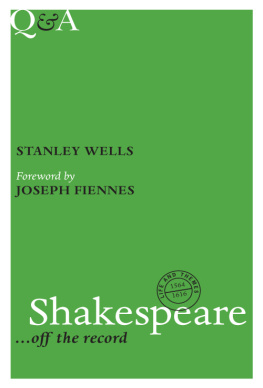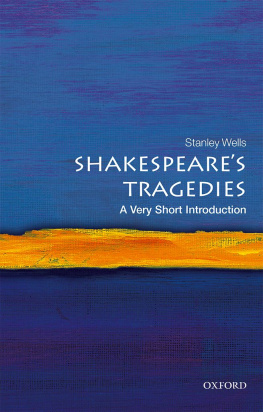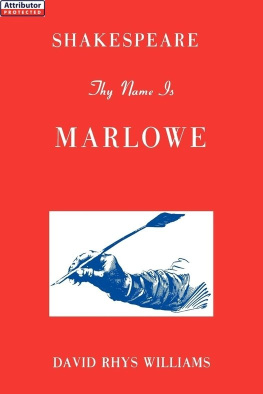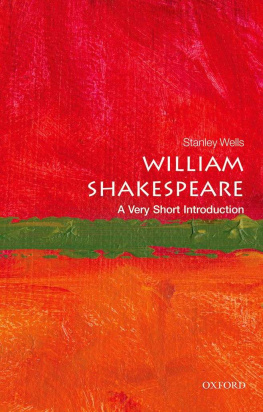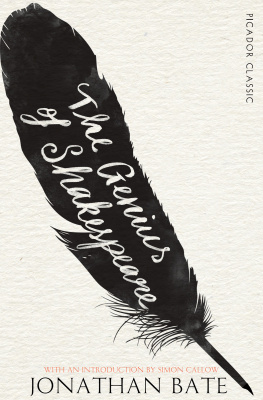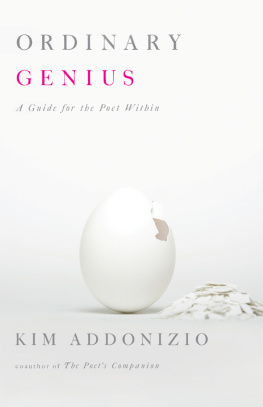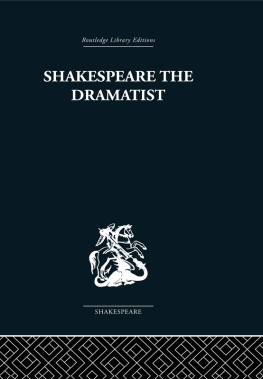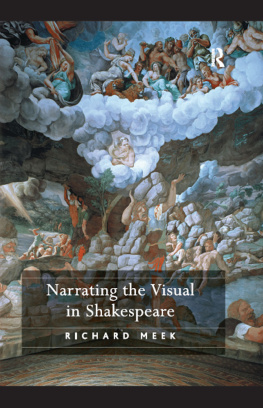Stanley Wells - Q&A Shakespeare: ... Off the Record
Here you can read online Stanley Wells - Q&A Shakespeare: ... Off the Record full text of the book (entire story) in english for free. Download pdf and epub, get meaning, cover and reviews about this ebook. year: 2012, publisher: Watkins Media, genre: Non-fiction. Description of the work, (preface) as well as reviews are available. Best literature library LitArk.com created for fans of good reading and offers a wide selection of genres:
Romance novel
Science fiction
Adventure
Detective
Science
History
Home and family
Prose
Art
Politics
Computer
Non-fiction
Religion
Business
Children
Humor
Choose a favorite category and find really read worthwhile books. Enjoy immersion in the world of imagination, feel the emotions of the characters or learn something new for yourself, make an fascinating discovery.
- Book:Q&A Shakespeare: ... Off the Record
- Author:
- Publisher:Watkins Media
- Genre:
- Year:2012
- Rating:4 / 5
- Favourites:Add to favourites
- Your mark:
- 80
- 1
- 2
- 3
- 4
- 5
Q&A Shakespeare: ... Off the Record: summary, description and annotation
We offer to read an annotation, description, summary or preface (depends on what the author of the book "Q&A Shakespeare: ... Off the Record" wrote himself). If you haven't found the necessary information about the book — write in the comments, we will try to find it.
Q&A Shakespeare: ... Off the Record — read online for free the complete book (whole text) full work
Below is the text of the book, divided by pages. System saving the place of the last page read, allows you to conveniently read the book "Q&A Shakespeare: ... Off the Record" online for free, without having to search again every time where you left off. Put a bookmark, and you can go to the page where you finished reading at any time.
Font size:
Interval:
Bookmark:

Q&A

Shakespeare
...off the record
Q&A
STANLEY WELLS
Foreword by
JOSEPH FIENNES

Shakespeare
...off the record

WATKINS PUBLISHING
LONDON
Shakespeare
Stanley Wells
co-written with Paul Edmondson
This edition first published in the United Kingdom and Ireland in 2011 by Watkins Publishing, an imprint of Duncan Baird Publishers Ltd
Sixth Floor, Castle House
7576 Wells Street, London W1T 3QH
Conceived, created and designed by Duncan Baird Publishers
Copyright Duncan Baird Publishers 2008,
2011 Text copyright Stanley Wells 2008, 2011
Foreword copyright Joseph Fiennes 2008
All rights reserved. No part of this book may be reproduced in any form or by any electronic or mechanical means, including information storage and retrieval systems, without permission in writing from the publisher, except by a reviewer who may quote brief passages in a review.
The right of Stanley Wells to be identified as the Author of this text has been asserted in accordance with the Copyright, Designs and Patents Act of 1988.
Managing Editors: Gill Paul and Peggy Vance
Co-ordinating Editor: James Hodgson
Editor: Susannah Marriott
Managing Designer: Clare Thorpe
British Library Cataloguing-in-Publication Data:
A CIP record for this book is available from the British Library
ISBN: 978-1-78028-196-4
10 9 8 7 6 5 4 3 2 1
Typeset in Dante MT and Baskerville BT
Printed in Shanghai by Imago
CONTENTS
FOREWORD by Joseph Fiennes
W ho was William Shakespeare? There are as many theories as there are academics, as many factions as there are experts. When I was preparing to play him in the film Shakespeare in Love, my starting point was that he was an incredible observer of the people around him, soaking up their characteristics like blotting paper. The key is that Will Shakespeare was Everyman: politically his views ranged across the board; in religious matters he was non-committal; sexually he was able to inhabit all points of view. He could deal with everyone from street urchins to monarchs, and he had the same problems as his characters. Being aware of his own doubts and contradictions made him intensely human.
One of my favourite speeches is The Seven Ages of Man from As You Like It, in which he describes the parts we all play through our lives from mewling infant through lover, soldier and wise man to second childhood. Shakespeares canon seems to reflect the stages of his own life, from the brilliantly crisp verse of Romeo and Juliet, through the middle difficult period of Measure for Measure and the man suffering from depression in Hamlet, and then the ebullience and transcendence of The Tempest. His life is set out for us in his works, in the same way that a chronological exhibition of Rembrandts self-portraits, with their shimmering beauty and extraordinary vision of human frailty, would chart the progress of that artists life.
Despite the huge thrust of technological advance since the Elizabethan era, the human condition Shakespeare wrote about remains timeless. We still fall in love and get angry and avaricious; we are materialistic or fanatical or seek spirituality. Here was a man who understood all the pain of being human, yet loved life and humour and fun. Put simply, he was one of the greatest-ever literary humanists.

INTRODUCTION
O ver the past four centuries, Shakespeares iconic status as a poet and dramatist has come to represent what it means to be a genius, and his words have provided a language of self-expression for every human emotion. Shakespeare is cited as an authority in moral, political and cultural contexts that even he could never have dreamed of. His very name can stimulate approval, challenge, argument, lunacy, brilliance and, occasionally, especially among schoolchildren, boredom. Shakespeares legacy represents more than the story of a life and its age: it has dominated artistic and cultural endeavour in every generation that has followed him.
What would it be like to meet Shakespeare? What kind of man was he? What would we most like to ask him? How would he reply? These are some of the questions that faced us in undertaking this project, and percolated through it as the coffee brewed.
First, what tone of voice would be appropriate for the worlds greatest writer? Clearly he could not speak in blank verse, and we had no wish to invent a fustian pseudo-Shakespearian lingo full of arch archaisms. He should, we decided, speak in an informal, friendly, unobtrusively modern fashion, which might incorporate a few submerged allusions to his work. We wanted him to sound good-humoured and unpompous, and not to take himself too seriously, because this is how we imagine he really was. We wanted him to come across as a thorough-going professional, a good colleague, a poet with his feet on the ground, but also justly proud of his professional achievements. We envisaged a degree of nostalgia appropriate to a man at the end of his life, and this allowed us to colour his responses with a human but never sentimental perspective. We saw him as a man of fundamental humility. A working man, practical in his attitudes to life and devoted to his family.
By necessity, there is a considerable element of interpretation in this book. The recorded facts about Shakespeares life are patchy, leaving much to be imagined. In the interview that follows the biographical overview here, we have tried to be true to the known facts as much as possible, and to fill in the gaps with reasonable conjecture. We have tried also to humanize the record to make Shakespeare sound like the deeply thoughtful, wise, non-judgmental, humorous, sweet-natured and immensely sympathetic person that we believe him to have been.
WILLIAM SHAKESPEARE (15641616)
His Life in Short
A hush has descended on the Globe Theatre. The packed audience of three thousand lords, ladies, gentlemen, merchants, tradesmen, sailors, lawyers, servants, apprentices, schoolboys, prostitutes, brothel keepers and beggars, many of whom have paid only one penny to stand as groundlings in front of the stage are watching a brand-new play in broad spring daylight. Richard Burbage enters as the old King Lear. In his arms is his daughter, Cordelia, played by a boy actor. Burbage fills the rapt silence with sounds of torment even more painful than his cries of madness on the heath an hour or so earlier. His beloved Cordelia is dead as earth. Nothing as unremittingly bleak has ever been seen on the English stage. Departing radically from previous tellings of the story, William Shakespeare, the plays 42-year-old author, has been brave enough to let Cordelia die. By so doing, he has raised stark questions about the nature of existence, questions raised afresh each time King Lear is performed. Arguably the greatest of Shakespeares plays, King Lear is also one of humanitys finest artistic achievements.
But who was Shakespeare, and how did he acquire such a brave, radical and questioning outlook? Many misguided people devote their lives to arguing that the William Shakespeare of Stratford-upon-Avon did not write the works attributed to him. Bizarre quests to ascertain who wrote his plays started in the late 18th century, and it sometimes seems that any other candidate will do, provided that he or she is either an aristocrat or university-educated. It is too readily assumed that little is known about Shakespeares life. Inevitably there are gaps, but there is also much documented information.
Font size:
Interval:
Bookmark:
Similar books «Q&A Shakespeare: ... Off the Record»
Look at similar books to Q&A Shakespeare: ... Off the Record. We have selected literature similar in name and meaning in the hope of providing readers with more options to find new, interesting, not yet read works.
Discussion, reviews of the book Q&A Shakespeare: ... Off the Record and just readers' own opinions. Leave your comments, write what you think about the work, its meaning or the main characters. Specify what exactly you liked and what you didn't like, and why you think so.

